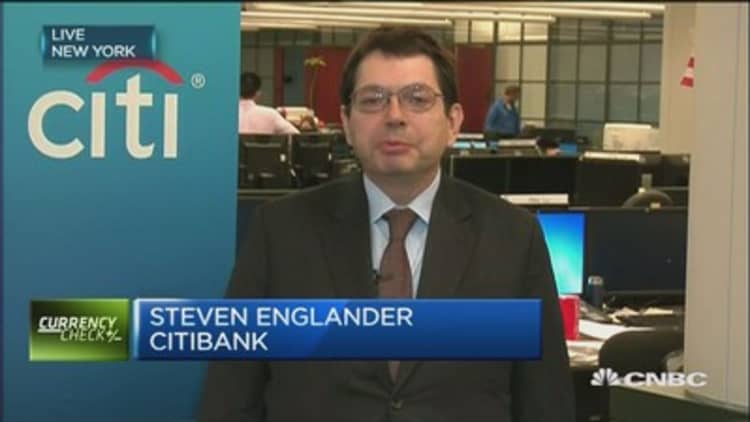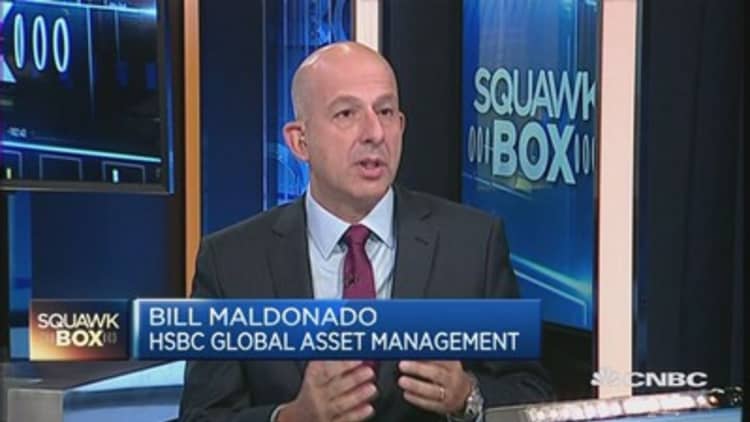Asian stocks were mostly lower amid choppy trade on Friday, tracking the lackluster lead from Wall Street as uncertainty over the outlook of U.S monetary policy sapped investor confidence.
In a speech that occurred after the market close, Federal Reserve chair Janet Yellen said that an interest-rate hike "sometime later this year" would likely be appropriate, though the decision hinges on economic data. Yellen was speaking at the University of Massachusetts on Thursday.
The greenback jumped against a basket of currencies after the speech. The euro fell about 0.5 percent to $1.1174 from around $1.1230 while dollar-yen rose to around 120.27, from around 120.00 before Yellen's remarks.
"Our view for a December rate hike has not changed," Cynthia Jane Kalasopatan of Singapore's Mizuho Bank wrote in a note. "Overall, we acknowledge that some caution prevail amid China's wobbles and a strong [greenback] but U.S. data releases continue to point to a broad recovery picture. With no major data releases or events, Fed's policy outlook may be the key driver in markets today."
The closed down 0.5 percent, with Caterpillar down 6.3 percent on news that the firm will cut up to 5,000 jobs by end-2016 and lowered guidance. The S&P 500 eased 0.3 percent while the tech-heavy Nasdaq Composite more than halved losses in the afternoon trading session to finish 0.4 percent lower.
Nikkei rises 1.8%
Japan's Nikkei 225 index swung up in the final hour of trading to close up nearly 2 percent, recouping almost two-thirds of Thursday's steep 2.8 percent slump.
Market watchers who spoke to CNBC attributed the late-day rally to speculation that the Bank of Japan (BOJ) will be stepping up its easing at the October policy meeting. BOJ Governor Haruhiko Kuroda met Japanese Prime Minister Shinzo Abe on Friday following mixed inflation data released before the market open.
"It was quite an interesting inflation report today. Core consumer prices dropped 0.1 percent in August, turning negative for the first time since April 2013 but consumer inflation excluding food and energy costs were slightly ahead of expectations. So even though we saw some inflationary pressure, the BOJ is likely to step up its QQE program in its October meeting," IG market analyst Angus Nicholson told CNBC by phone.
"But with the BOJ buying all Japanese government bonds, what else can they do to create further monetary stimulus? They may have to explore other options such as state bond issuance or lowering the reserve requirement ratio," he added.
Meanwhile, Prime Minister Abe said early Friday that he had set out three new goals for "Abenomics" and will target a 20 percent increase in gross domestic product (GDP).
"The Japanese recovery is flagging and authorities are concerned that they are losing momentum and they are trying to restore confidence in the medium term despite the near-term performance," Steven Englander, global head of G10 FX Strategy at Citibank, told CNBC.
Export-oriented stocks recovered their footing late Friday, with carmakers such as Toyota Motor and Suzuki Motor changing course to power up 1.3 and 2 percent respectively.
Among decliners, Sharp plunged 5.8 percent after the Nikkei business daily reported the company is likely to book a 30 billion yen loss for the April-September half. A 1.3 percent tumble in the shares of industrial robot maker Fanuc also weighed on the bourse.

Mainland indices fall
China's Shanghai Composite ended down 1.6 percent, with infrastructure and transport-related shares among the hardest-hit, amid falling trading volumes.
According to Reuters, weekly volumes have fallen nearly 80 percent from their July peak and averages remain on a downward trajectory.
Maanshan Iron and Steel Company tumbled 5.6 percent, while China Railway Group and China Railway Construction declined 3.5 and 2.9 percent respectively. Airline stocks such as China Eastern Airlines, China Southern Airlines and Air China receded more than 3 percent each.
Among other indexes, the benchmark CSI300 Index slumped 1.6 percent. Small-caps suffered bigger losses, with the Shenzhen Composite and start-up board ChiNext losing over 3 and 4 percent respectively.
In Hong Kong, the Hang Seng index pared losses to edge up 0.4 percent.
Read MoreThe surprise silver lining to China's economy
ASX drops 0.6%
Australia's index surrendered early gains after financial and energy counters slid deeper into the red.
Commonwealth Bank of Australia tanked 1.5 percent, while National Australia Bank, Australia and New Zealand Banking and Westpac receded between 1.2 and 1.4 percent.
Jitters in the oil markets ignited 'risk off' sentiment for energy names; Oil Search and Santos closed down more than 3 percent each, while Origin Energy lost 2.4 percent.
But gold producers held up, with Evolution Mining and Newcrest Mining leaping 3 and 4.1 percent respectively, thanks to firmer gold prices for the second straight session overnight.
Myer also outperformed the bourse with a rise of 8.4 percent, after Citi upgraded its call on the stock to 'buy' from 'neutral.'
Kospi dips 0.2%
South Korea's Kospi index finished near its lowest level since September 15, as foreign investors offloaded shares for the fifth consecutive session.
Heavyweight components ended the day on a dismal note; Samsung Electronics and Posco closed down more than 1 percent each.
But Hyundai Motor shares helped to offset losses by surging 2.5 percent on the back of news that its vice chairman and heir-apparent Chung Eui-sun bought shares worth about 500 billion ($420 million). Hyundai Glovis and Hyundai Heavy Industries also soared 7.3 and 2.6 percent respectively.
Chung, 44, the only son of Hyundai Motor's chairman Chung Mong-koo, now holds about 1.4 percent of Hyundai Motor after buying 3.16 million shares from Hyundai Heavy Industries, reported Reuters citing a regulatory filing. "It could be taken as Chung Eui-sun's step in earnest toward succession of the ownership structure,"Park Ju-gun, head of research firm CEO Score, told the newswire.
Among gainers, SK Telecom which announced on Thursday plans for a share buyback worth 523 billion won ($438.21 million), recouped losses to tick up 0.2 percent.

Rest of Asia
Taiwan's weighted index ticked up 0.1 percent after weaving in and out of negative territory all day, as investors weighed the central bank's decision to lower its benchmark discount rate to 1.750 percent from 1.875 percent on Thursday
This marks the Central Bank of the Republic of China's (CBC) first rate cut since 2009, sending the local currency to a six-year low of 33.285 versus the U.S. dollar in the previous session.
Meanwhile, the central bank guided the overnight interbank rate lower on Friday, lowering it to 0.30 percent from 0.32 percent a day earlier.
"While the description of the domestic economy didn't contain any new information or forecasts, the contrast with the description in the June statement underscored the deterioration that occurred in the second quarter. We blame an adverse export shock emanating principally from the U.S. and China," ING Financial Markets' head of research Asia, Tim Condon, wrote in a note.
Read MoreSingapore closes schools as haze worsens
Elsewhere in the region, Singapore's industrial production fell 7.0 percent in August from a year earlier, wider than the 5.0 percent drop forecast in a Reuters poll and below July's 6.1 percent decline. On a month-on-month basis, output plunged 3.7 percent, significantly below the 0.2 percent dip that Reuters estimated and worse than 1.0 percent rise in July.
The benchmark Straits Times index declined 0.5 percent to hover near a one-month trough.
Meanwhile, markets in India and the Philippines are closed for public holidays.

